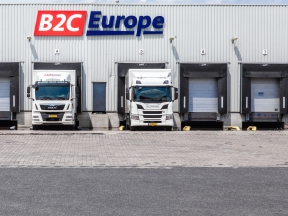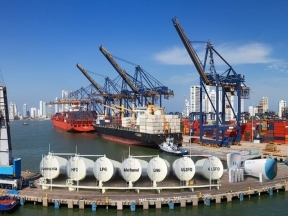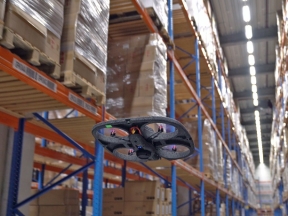In its latest joint report with Indospace titled ‘Electric Mobility in Full Gear’, Colliers estimates that the Electric Vehicles (EVs) segment in India is likely to witness investments of USD12.6 billion or INR94,000 crore across the automotive value chain, over the next five years. The investments are likely to benefit the Indian real estate sector in the form of setting up new or augmenting manufacturing units, industrial parks, and clusters with focus on last mile delivery by E-commerce firms and 3PL companies, government push for electrification of public transport, tax benefits and incentives for first time buyers amongst others. Tamil Nadu is the frontrunner accounting for about 34% share in total planned investments for EV, followed by Andhra Pradesh and Haryana with a share of 12% and 9% respectively. Currently, 15 Indian States have either approved or notified EV policies, with 6 more states in the draft stage. States like Delhi, Gujarat, Maharashtra, and Meghalaya are focusing on demand incentives, whereas southern states and Uttar Pradesh are focusing on manufacturer-based incentives. States like Maharashtra, Delhi and Gujarat having strong demand side incentives should have provisions to set up industrial parks/clusters for EV or manufacturing of ancillary components with plug-and-play.
Read More »Shypmax collaborates with B2C Europe to facilitate last-mile delivery
Shypmax, India’s first and only AI-powered Logistics Platform as a Service (LPaaS) for cross border shipping, has secured an exclusive partnership with the Netherlands based B2C Europe, a Maersk company specializing in B2C parcel delivery services in Europe. The collaboration will enable Indian businesses to deliver their products to Europe, including the UK, based customers cost-effectively using a single-window platform. From Shypmax, Indian companies, especially SMEs, Direct-to-customer, B2C, and E-commerce firms, from over 27,000 pin codes, can deliver any product across European markets and beyond. Shypmax automates processes related to compliance with current regulations in the European Union. As India’s first Import One-Stop-Shop (IOSS) ready facility enabling centralised declaration and payment of VAT by European customers at the point of sale, Shypmax is saving Indian companies and the European customers from the hassles of navigating through different tax systems in Europe. The services also include customised labels, pickup, packaging, and door-to-door delivery via more than 100 connected carriers across Europe and beyond by B2C Europe.
Read More »Reducing carbon footprints to set the trend for 2022
WebXpress has identified a few key trends in the logistics sector which will be trendsetter in 2022. Covid-19 has shaken the roots of the well-oiled world of Logistics. Before Covid-19, most companies assumed seamless movements, stable freight rates, unlimited capacity, and minimum buffer. But an even bigger disruption is on the way as major economies enforce climate commitments and consumers force companies to comply with them. Key tech trend that would drive logistics industry in managing climate goals: * Climate Measurement / Monitoring Tools * Localized Climate Data * Optimum EV Asset Utilization Tools * Carbon Trading Apurva Mankad, CEO and Founder, WebXpress adds, “World is entering a new phase of energy challenges. There will be a gap between cutting fossil fuel dependence while ramping up green energy sources. Logistics is one of the biggest emitter and its also technically easier to solve the issue of excess emission when compared to cement production. All you need to do is convert all vehicles to EV and run all warehouse on Solar energy. Of course, the reality will be far more complex and it will vary across nations. Companies need to offset emissions in one part of the supply chain with initiatives in distant locations. Here, technology will play a crucial role to track every movement, every km and measure its impact. The coming decade belongs to Global Green Tech.”
Read More »New lubricants to ensure smooth transition to alternative fuels
Ship operators must work alongside the companies they charge with maintaining engine condition in order to ensure a smooth transition to using alternative fuels. That is the challenge laid down by Lubrizol’s Technical Manager for Marine Engine Oils, Ian Bown, as the company explores how it must adapt lubricants to protect ship engines burning alternative fuels. Shipping’s long-term environmental targets are propelling the industry’s quest for new, cleaner fuels. But while the big target – cutting greenhouse gas emissions by at least 50 percent compared with 2008 levels – is still 29 years away, time is short for the task at hand. Engine technologies for many of the candidate fuels have yet to reach even the pilot stage in commercial shipping, but the lifespan of vessels means that fuel choices will need to be made very soon for newbuilds that will likely still be trading by 2050. The long development cycle for cylinder oils is another challenge. “It is well recognized within the industry that while changes come quite quickly in some areas, lubricant development is sometimes not as fast,” says Bown. “That’s because we have to understand the impact of these fuels when they’re in service.”
Read More »ProcMart launches VMI app to effectively manage inventory and avoid stock-outs
ProcMart has launched its first-ever VMI app. The app will streamline inventory-management processes and operations, while also making ProcMart’s systems more mobile-friendly. Users will be able to access precise data on product usage on a real-time basis, consequently forecasting future demands and planning ahead in a seamless manner, via the platform. Additionally, they will have access to a plethora of features, including an easy-to-use barcode scanner, which will allow ProcMart to affix barcode tags to any products left at the client’s location. Owing to this feature, every time someone at the client’s premises needs to use that product, all they need to do is scan the barcode to register their usage. Using this app, ProcMart will be fully aware of the warehouse inventory at all times, which will also aid in better supply and procurement-management, by allowing the right products to be sourced at the right time. Commenting on the app launch, Anish Popli, CEO & Founder, ProcMart said, ‘With the launch of our VMI app, we aim to simplify the supply-chain as well as operations by recording all transactions, on-the-go. Procurement executives currently make up for about 73% of the workforce, which not only demonstrates the need to adopt mobile commerce, but also deliver a B2B-ready, mobile-friendly solution to clients. This app will significantly reduce the time and effort spent in operations, and consequently enhance capital efficiencies for our clients. Moreover, the app will also enable better supply of products for clients, owing to the availability of real-time data analytics, at the tap of a button.’
Read More »Wipro Selects Oracle Cloud to speed digitalization of air cargo processes
Oracle announced that Wipro Limited has chosen Oracle Cloud Infrastructure (OCI) to power its next-generation Cargo Reservations, Operations, Accounting and Management Information System (CROAMIS) Application suite. This will allow Wipro to offer CROAMIS as part of Wipro FullStride Cloud Services, to customers worldwide, aiding faster modernization of the air cargo industry amidst growing demand for rapid cargo transportation services. Wipro chose OCI for its superior performance, high availability, built-in security, and lower cost. “There has been significant change in the supply chain, particularly in key industries such as pharma and e-commerce, which need goods to be moved rapidly around the world. While this has led to air cargo gaining share, it has also created the need for this industry to fast-track its modernization through the use of cloud and other digital technologies,” said Gopi Krishnan, Vice President and Managing Partner, Domain & Consulting Services, Consumer Sector, Wipro Limited. “Now, with CROAMIS on OCI, we will further strengthen our position as the technology partner of choice for many air cargo organizations. We envision its use will help our customers to scale faster, achieve increased business efficiencies, accelerate their pace of innovation, benefit from greater security, and reduce their data storage and outbound data transfer cost.”
Read More »CARGO FLASH TO DELIVER SINGLE SOLUTION TO KENYA AIRWAYS
Cargo Flash Infotech will be replacing Kenya Airways’ manifold of operations and management systems that were either having limited connectivity options or systems working in silos, in which information sharing is restricted due to systems’ limitations. Kenya Airways’ numerous operations and management systems are currently being substituted by Cargo Flash’s single, next-generation ‘nGen’ system that includes Cargo Reservations (RES) System, Cargo Revenue Accounting (CRA) System, Cargo Handling and Warehouse Management, ULD Management Solution, and Customer Portal. Furthermore, the new and additional systems included as a part of this single ‘nGen’ system are Mail Booking and Handling System, E-commerce (Door-to-Door) System, Target Planning System, in addition to Complaint and Claim Management System. The web-based solutions will further bolster the airline’s scope to reap a seamless, error-free and spontaneous management, accumulating several processes under one roof. “Not only will Cargo Flash’s next-generation systems automate documentation and other cargo management processes but will also streamline Kenya Airway’s operational requirements along with boosting their efficiency and increasing revenue,” added Gautam Mandal, Director – Products, Cargo Flash Infotech. “We are pleased to have joined hands with Kenya Airways and deliver such an integrated solution to tackle the crucial concerns of cargo operation and administration,” he further adds.
Read More »Singapore Airlines partners with WiseTech Global to enable eBooking service
Singapore Airlines and WiseTech Global, provider of leading logistics execution platform CargoWise, have partnered to provide a direct exchange of eBookings between their systems, adding significant value to many forwarders across the globe. The integration is the first of its kind for SIA and through the use of custom APIs, allows CargoWise customers, including some of the world’s largest freight forwarders, direct access to SIA to book and modify shipments in real-time from within the CargoWise platform. Chin Yau Seng, senior vice president cargo, Singapore Airlines said, “We are committed to the continued digitalization of all areas of our business. Our partnership with WiseTech Global will result in the integration of our eBooking systems, enabling customers to book airfreight directly with SIA via the CargoWise online platform. This is one of the many steps that we are taking to provide a more seamless experience for our cargo customers.”
Read More »LATAM Cargo and cargo.one collaborate to strengthen digital air cargo services
LATAM Airlines Group and its cargo subsidiaries have collaborated with a leading digital sales platform cargo.one, making the carriers’ network available for instant booking on the cargo.one platform. This milestone is part of LATAM Cargo’s innovative digitalization agenda, with the aim of diversifying its distribution channels while offering its customers best-in-class direct booking options. “We want to provide customers with reliable and efficient solutions and a broad set of options that allows them to choose what works best for them. The LATAM Cargo carriers’ network and product portfolio are great examples of that. Partnering with cargo.one is fully aligned with this goal as it gives customers access to LATAM’s cargo capacity through an innovative way,” comments Andres Bianchi, Chief Executive Officer of LATAM Cargo.
Read More »Logistics automation plays key role in business navigation
Even as global trade is resurging in a post-Covid world, supply chain management has emerged as an integral component for businesses. An efficient and effective supply chain, with a robust logistics system at its core, mitigates supply bottlenecks, yields competitive edge, and enhances profitability. While the pandemic heightened the challenges for organisations and drove them to recalibrate their sourcing and distribution structures, Covid-19 also acted as a catalyst for change, accelerating the momentum for a technology-powered transition. Through the pandemic, the e-commerce sector grew exponentially from 13% to 17% of total retail market, while paving the way for continued growth in the years to come. The Indian e-commerce sector is estimated to grow at a CAGR of 27% to reach the USD99-billion mark by 2024. The rise of e-commerce and the digital marketplace phenomenon are changing the dynamics of the market, both, in terms of buyer behaviour as well as business transformation. To thrive in the highly disruptive environment, businesses are re-examining their conventional operations and recalibrating supply chain strategies to improve efficiencies, lower costs and ensure sustainability. For this, an efficient logistics system can be a critical differentiator, and technology can serve as a key enabler.
Read More » Cargo Breaking News
Cargo Breaking News







